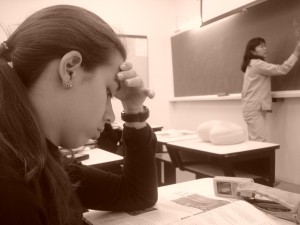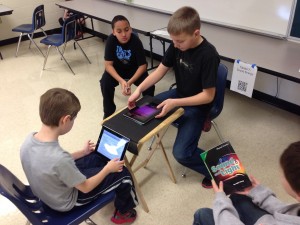Teachers: Apply to have your POPs be turned into web-based lessons!
Interested in using internet-based resources/tools/software in your teaching of PK-12 subject matter? Don’t have time or don’t know where to start?
Would you like your teaching to look more like the classroom on the left or the right? If you said you are inclined more the right-hand picture where students are exploring sound and recording an audio podcast, then read on…
Let Masters and Ph.D. students in the UTexas Learning Technologies program assist you in designing web-based teaching and learning plans specifically for a problem of practice (POPs) you identify, with the technological resources you have at hand in your school. Not only will you receive a lesson plan(s), but you’ll also receive a research-based rationale for why the plan will positively impact students’ learning.
Complete the following application by Jan 15, 2016 to secure review of your proposal by the class in late January 2016.
By applying you are agreeing that if chosen:
- You will try your hardest to be available via videoconferencing sometime b/w 4:00 – 7:00 PM (CST) on occasional Tuesdays: early February and on April 26 or May 3, 2016.
- You will be available to answer questions via email.
- The learning/lesson plans and research-based rationales will be distributed publicly free of charge with Creative Commons licensing.
Citizen Coyote Science Comes to Fruition
In December, I recorded my answer to the One Big Question “What’s the most important benefit technology can bring to the educational experience?” My answer to this question focuses on students’ abilities to create new knowledge with technology rather than only access and learn already-created knowledge. In my response below, I gave an example of children conducting a citizen science project that tracks coyote sightings in a neighborhood, examines ecological and biological reasons for the clash between the animals and people, and creates a report for a city council. I created this example from issues that were occurring in my own neighborhood where coyotes have been sighted quite often. Neighbors on the listserv swing widely from wanting to track down and kill the coyotes (who have been accused of killing pets) to protecting the coyotes as they are native to this area and honestly were here first.
Excitingly, a few weeks ago a neighbor mom posted on the listserv that an alternative to the dreaded “volcano experiment,” she suggested to her daughter to conduct a study on the coyotes. I quickly emailed her a link to my video (below) and encouraged her to pursue this avenue. I introduced her to the concept of citizen science. They then created a website and invited neighbors to post their sightings and comments. Did I mention that a 7-year old was conducting this research project? You can find her report of the problem, hypothesis and results here: https://zilkercoyotes.shutterfly.com/experiment. This student attends Zilker Elementary School in the Austin Independent School District.
CEC 2013 Presentation: Teaching and learning with iPads for high school students with disabilities
Please view and share the presentation “Teaching and learning with iPads for high school students with disabilities” by Minwook Ok and Joan Hughes. Minwook presented this paper for us at the Council for Exceptional Children conference in 2013. This presentation reflects research we’ve been conducting in a high school where all the students have iPads. This particular work reflects teaching and learning in a modified biology classroom.


